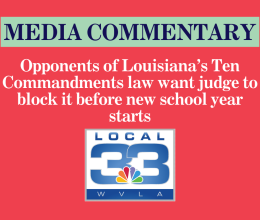BY LORENA O'NEIL
While defending Louisiana's controversial new legislation requiring the Ten Commandments be displayed in all classrooms, including K-12 schools, colleges, and universities, Republican Gov. Jeff Landry and Attorney General Liz Murrill on Monday unveiled sample posters that feature liberal icons, including the late Supreme Court Justice Ruth Bader Ginsburg and Hamilton playwright Lin-Manuel Miranda.
Louisiana passed its Ten Commandments law in June. The American Civil Liberties Union and other advocacy groups have filed a lawsuit arguing that the law violates “the separation of church and state and is blatantly unconstitutional.” At a press conference Monday, Murrill said she and the governor are requesting a federal court throw out what she describes as a “premature” lawsuit against the state, because the plaintiffs don’t claim to have seen any displays of the Ten Commandments yet in classrooms, so they “cannot prove they have any actual injury.” The state attorney general further argued the ACLU cannot show that every Ten Commandments display would be unconstitutional.
As examples, Landry and Murrill displayed large sample posters that Murrill said are “plainly constitutional” and could be placed in public school classrooms. There were a variety of posters, one targeting young children with classroom safety rules, one depicting Speaker Mike Johnson alongside a photo of the bust of Moses which is displayed in the House of Representatives.
Some of the posters seemed designed to make the Ten Commandments displays more palatable to liberals — or perhaps to bait them. Two have a quote from Ginsburg about great documents that provided the world “fine ideals and principles,” including the Ten Commandments and the Declaration of Independence.
Justice Ginsburg’s granddaughter Clara Spera says Louisiana is “misleading the public” by using Ginsburg’s quote, which was from a paper she wrote in 1946 when she was in eighth grade.
“The use of my grandmother’s image in Louisiana’s unconstitutional effort to display the Ten Commandments in public schools is misleading and an affront to her well-documented First Amendment jurisprudence,” Spera tells Rolling Stone in an email. “By placing the quote next to an official Supreme Court portrait of her in judicial robes and a jabot, Louisiana is misleading the public by suggesting that Justice Ginsburg made the statement about the Ten Commandments being among the world’s ‘four great documents’ while serving as a Supreme Court Justice.”
Spera, who is a reproductive rights attorney, cites McCreary County v. ACLU, where Ginsburg joined the majority opinion that held that Ten Commandments displays in Kentucky courthouses and public schools violated the Establishment Clause of the First Amendment. She continued “To me, and to others familiar with Justice Ginsburg’s legal writings and philosophy, there is no doubt that my grandmother would find that Louisiana’s effort to require public schools to display the Ten Commandments is a violation of the Constitution.”
Other posters have alternate commandments posted next to the Ten Commandments, such as one that displays Martin Luther King Jr.’s commandments of non-violence.
“There was this explosion of horror when the governor signed the law,” said Murrill. “I think that was a great overreaction and every one of these posters illustrates that.”
Murrill said the state’s Department of Justice sees these Ten Commandments posters as “teachable moments” for children.
One such teachable moment for school kids includes a side-by-side of Charlton Heston as Moses and a picture of Lin-Manuel Miranda from Hamilton. The Ten Commandments are placed next to the Ten Duel Commandments from the Broadway musical, which detail the rules of a gunfight at dawn. “Get some pistols and a doctor,” says one line. “Count 1, 2, 3, 4, 5, 6, 7, 8, 9, 10 paces. Fire!”
Yes, these duel commandments are placed next to the biblical decree: “Thou shalt not kill.”
The posters “show different ways that we can comply with the law and it isn’t going to cause the whole Constitution to cave under the weight of the law,” said Murrill. Under the Louisiana law, the Ten Commandments must be depicted “in a large, easily readable font,” and the poster can be no smaller than 11 by 14 inches. Posters will be donated to classrooms to be displayed.
At the press conference, Landry was asked about atheist parents who might not want their children to see the Ten Commandments at school, “If they find them so vulgar, tell the child not to look at them,” he replied.
“I did not know that the Ten Commandments was such a bad way for someone to live their life,” said Landry. “Many religions share and recognize [them] as a whole, so, really and truly, I don’t see what the whole big fuss is about.”
Landry has previously said he “can’t wait to be sued” for the Ten Commandments law, which he signed in June. Landry has also stated he thinks if the Ten Commandments had been displayed in Thomas Matthew Crooks’ classroom, he may have not attempted to assassinate former President Donald Trump. The legislation is scheduled to take effect in January 2025.
“The First Amendment of the U.S. Constitution protects everyone’s religious freedom.” Alanah Odoms, executive director at the ACLU of Louisiana, told Rolling Stone in a statement. “The Louisiana Legislature cannot impose its religious beliefs on our children and families. Forcing all public-school students to follow the state’s version of the Ten Commandments, regardless of their own beliefs, is unconstitutional. We will not back down from this fight and eagerly await our day in court.”
In 1948, the Supreme Court ruled in Everson v. Board of Education that “the First Amendment has erected a wall between church and state.” In 1962, the high court said officially-sponsored prayer in school was unconstitutional. When Louisiana tried to enact a law saying evolutionism and creationism should receive “balanced treatment” in science classes, the Supreme Court struck it down in 1987. However, recently, the court’s conservative supermajority in 2022 ruled in favor of a Christian public school football coach who prayed with his students, blurring the line between church and state at schools.
Murrill says she perceived the state legislature passing the Ten Commandments law as a statement that legislators and the people they represent are frustrated. “They are frustrated with the lack of discipline in our schools,” she said. “They’re frustrated with the inability of the whole system at this point to impose some rules of order, and so they went back to one of the original lawmakers who was Moses.”
Murrill said she believes the law will help “advance the education mission” in the state. Louisiana’s educational system is ranked one of the lowest in the nation, coming in at 40.
Landry, who was previously attorney general, became governor of the state in January. Under his watch, the state has passed a slew of conservative educational bills, including the Ten Commandments law, a “Don’t Say Gay” bill, and a measure allowing private school tuition vouchers.








